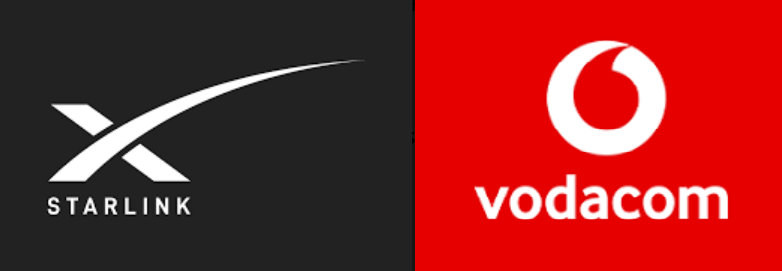
Vodacom Partners with Elon Musk’s Starlink to Expand Broadband Across Africa
Johannesburg, South Africa – November 12, 2025
Vodacom Group has entered into a landmark partnership with Elon Musk’s Starlink, the satellite internet division of SpaceX, to deliver high-speed broadband across Africa, a move set to redefine digital connectivity on the continent.
The agreement will see Vodacom integrate Starlink’s low-earth orbit (LEO) satellite technology into its mobile network infrastructure to enhance internet coverage in rural and hard-to-reach areas.
The partnership also allows Vodacom to resell Starlink’s services and equipment to businesses and individual customers across its African markets.
Vodacom said the collaboration is part of its long-term “Vision 2030” strategy aimed at expanding affordable internet access and bridging Africa’s digital divide.
The company noted that by using satellite backhaul, it can now provide reliable coverage in regions where laying fibre or building traditional base stations is difficult or costly.
“This partnership brings a new level of connectivity to millions of Africans who have long been excluded from reliable broadband access,” Vodacom said in a statement. “By combining our mobile expertise with Starlink’s satellite technology, we are taking another step toward an inclusive digital future for all.”
Industry experts describe the deal as one of the most significant collaborations yet between a major African telecom operator and a global satellite provider. It signals a shift in strategy as traditional network operators could increasingly turn to satellite solutions to fill connectivity gaps in remote areas in Africa.
Starlink’s low-earth orbit satellites deliver high-speed, low-latency internet that bypasses the limitations of ground-based infrastructure. This is particularly crucial in sub-Saharan Africa, where connectivity challenges persist due to rough terrain, and underdeveloped infrastructure.
According to market analysts, the Vodacom-Starlink partnership could set a precedent for hybrid network models, combining fibre, 5G, and satellite systems, across the continent.
While the agreement promises faster and broader internet access, regulatory challenges remain in several African countries, including South Africa, where Starlink has yet to receive full licensing approval.
Discussions between regulators and service providers are ongoing over compliance with local empowerment and ownership laws. Industry observers believe Vodacom’s entry into the partnership could help accelerate regulatory alignment and foster a clearer policy framework for satellite-based internet services.
“Satellite connectivity is no longer a luxury, it’s an essential part of Africa’s economic growth,” said a telecom analyst in Johannesburg. “This partnership could reshape competition and policy thinking across the continent.”
The partnership is expected to benefit rural schools, healthcare centres, and small enterprises that struggle with limited or unreliable internet access. It may also boost Vodacom’s competitive edge over other major players like MTN and Airtel by offering a more diverse connectivity portfolio.
However, experts have also noted potential challenges, including the safety of user information, the relatively high cost of satellite hardware, and monthly subscriptions, which may limit adoption in low-income communities.
Despite these hurdles, the partnership represents a significant step toward inclusive connectivity and could fast-track Africa’s progress toward the United Nations’ digital inclusion goals.